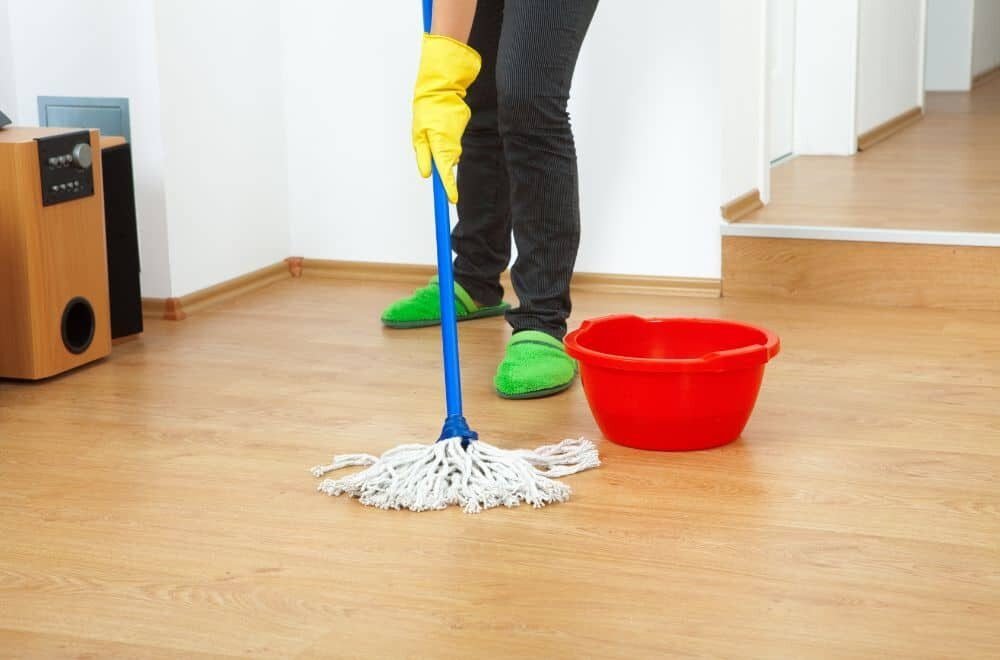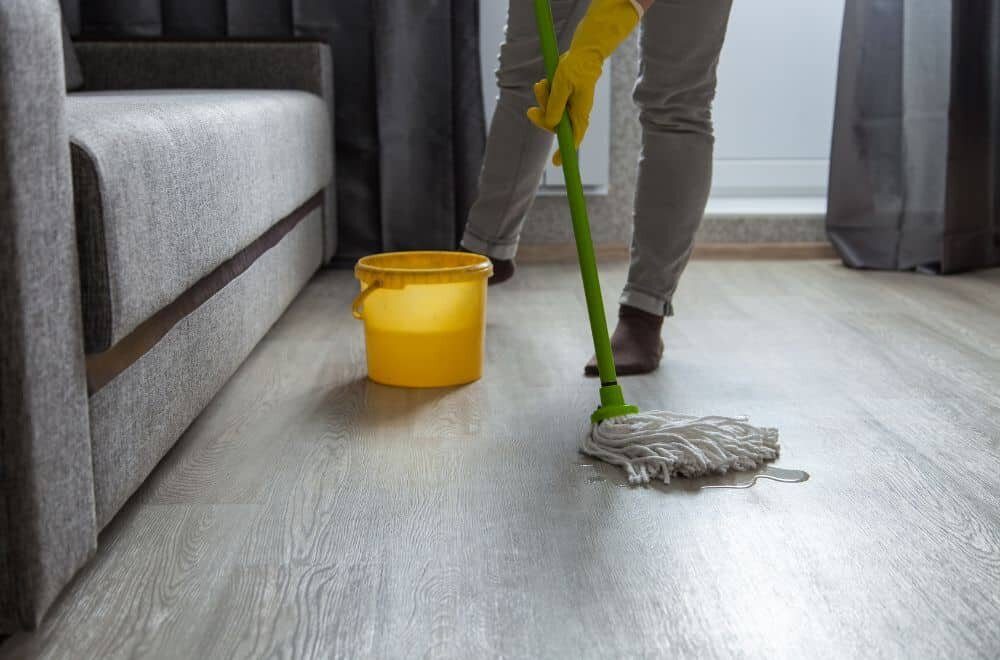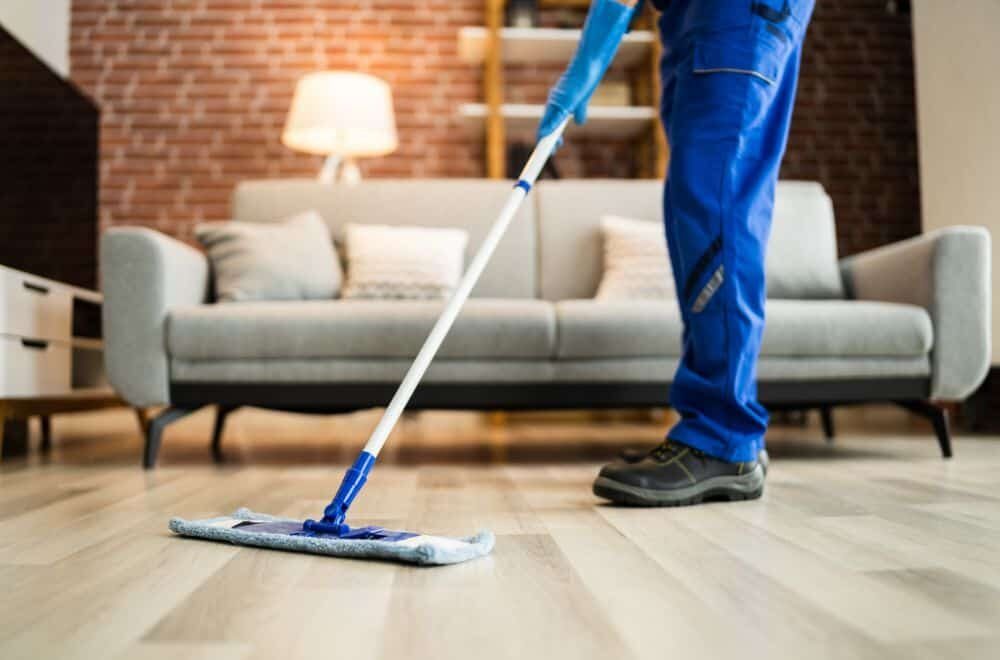Are you wondering if white vinegar diluted in water can be used to clean your hardwood floors? The answer is yes, but with some important considerations. While vinegar is a natural and inexpensive cleaning solution, it can damage your hardwood floors if used improperly. In this article, we will explore the do’s and don’ts of cleaning hardwood floors with vinegar to help you keep your floors looking their best.
Before you start cleaning your hardwood floors with vinegar, it’s important to understand the potential risks. Vinegar is acidic and can strip the finish off your floors if used in high concentrations or too frequently. However, when diluted properly, vinegar can be an effective and safe cleaning solution. We will discuss the right ratio of vinegar to water, as well as other tips to help you avoid damaging your hardwood floors. By following our guidelines, you can use vinegar to clean your floors without worrying about causing harm.
Understanding White Vinegar
If you’re looking for a natural and affordable cleaning solution, white vinegar is a popular option. But what exactly is white vinegar, and how can it be used to clean hardwood floors?
White vinegar is a clear, acidic liquid made from fermented grain alcohol. It typically has a pH of around 2.5 – 3.5, which makes it effective at breaking down dirt, grime, and mineral deposits. When diluted with water, white vinegar can be used to clean a variety of surfaces, including hardwood floors.
It’s important to note that not all types of vinegar are created equal. While white vinegar is a great all-purpose cleaner, other types of vinegar, such as apple cider vinegar or balsamic vinegar, may contain sugars or other additives that can leave behind a sticky residue. Stick with white vinegar for cleaning purposes.
When using white vinegar to clean hardwood floors, it’s important to dilute it properly. A solution of 1/4 cup of white vinegar to 1 gallon of warm water is a good starting point. Avoid using undiluted vinegar, as it can be too acidic and may damage your floors.
In addition to its cleaning properties, white vinegar also has some other benefits. It’s non-toxic, biodegradable, and safe to use around children and pets. Plus, it’s much cheaper than many commercial cleaning products.
Overall, white vinegar is a versatile and effective cleaning solution for hardwood floors and many other surfaces in your home. Just be sure to dilute it properly and avoid using it on surfaces that may be sensitive to acidity.
The Science Behind Vinegar and Hardwood Floors

Acidity of Vinegar
Vinegar is a natural cleaning agent that is commonly used in households. It is a diluted solution of acetic acid, which makes it acidic. The acidity of vinegar can range from 2.4 to 3.4 pH, depending on the type of vinegar.
When vinegar is mixed with water, it becomes less acidic. A solution of 50% water and 50% vinegar has a pH of around 2.5 to 3.0. This level of acidity is safe for most hardwood floors.
However, it is important to note that vinegar should not be used on floors that have been treated with wax or oil-based finishes. The acidity of the vinegar can break down the wax or oil, causing damage to the floor.
Effect on Hardwood
When used in moderation, vinegar can be an effective cleaner for hardwood floors. It can help remove dirt, grime, and stains without leaving behind a residue. Additionally, vinegar is a natural disinfectant, which makes it a great choice for households with pets or young children.
However, it is important to use vinegar in moderation. Overuse of vinegar can damage hardwood floors, especially those with a polyurethane finish. The acidity of the vinegar can strip away the protective coating, leaving the wood vulnerable to damage.
To avoid damage, it is recommended to dilute vinegar with water and use it sparingly. A good ratio to follow is 1/4 cup of vinegar to 1 gallon of water. Additionally, it is important to avoid using abrasive materials, such as steel wool, when cleaning hardwood floors with vinegar.
In summary, vinegar can be an effective cleaner for hardwood floors when used in moderation. The acidity of the vinegar can help remove dirt and grime without leaving behind a residue. However, it is important to dilute vinegar with water and avoid using it on floors with wax or oil-based finishes.
Dilution Process
Cleaning hardwood floors with vinegar and water is a great way to remove dirt and grime without using harsh chemicals. However, it’s important to dilute the vinegar properly to avoid damaging your floors. In this section, we’ll walk you through the ideal vinegar to water ratio and the preparation steps for cleaning your hardwood floors with vinegar.
Ideal Vinegar to Water Ratio
The ideal vinegar to water ratio for cleaning hardwood floors is 1 cup of vinegar to 1 gallon of warm water. This ratio is safe for most hardwood floors, but if you’re unsure, it’s always a good idea to test the solution on a small, inconspicuous area first.
If you have particularly dirty floors, you can increase the vinegar concentration slightly, but be careful not to use too much vinegar as it can damage the finish on your floors. A good rule of thumb is to never use more than 1 cup of vinegar per 1 gallon of water.
Preparation Steps
Now that you know the ideal vinegar to water ratio, let’s go over the preparation steps for cleaning your hardwood floors with vinegar.
- Start by sweeping or vacuuming your floors to remove any loose dirt and debris.
- Mix 1 cup of vinegar with 1 gallon of warm water in a bucket.
- Dip a mop or cloth into the solution and wring it out well. You want the mop or cloth to be damp, but not soaking wet.
- Begin mopping your floors, working in small sections at a time. Be sure to rinse your mop or cloth frequently to avoid spreading dirt and grime around.
- Once you’ve mopped the entire floor, go over it again with a clean, damp mop or cloth to remove any excess vinegar solution.
- Allow your floors to air dry completely before walking on them.
That’s it! Cleaning your hardwood floors with vinegar and water is a simple and effective way to keep them looking their best. Just be sure to follow the ideal vinegar to water ratio and preparation steps to avoid damaging your floors.
Cleaning Procedure

Frequency of Cleaning
The frequency of cleaning your hardwood floors depends on the amount of foot traffic and the level of dirt and debris. Generally, it is recommended to clean your hardwood floors once a week. However, if you have pets or children, or if your living area is prone to dust and dirt, you may need to clean your floors more frequently.
Step-by-Step Guide
Cleaning your hardwood floors with white vinegar diluted in water is a safe and effective way to keep them clean and shiny. Here is a step-by-step guide to help you get started:
- Clear the floor of any furniture or obstacles that may get in the way of cleaning.
- Sweep or vacuum the floor to remove any loose dirt, dust, or debris. This will prevent scratching the floor while mopping.
- Mix a solution of white vinegar and warm water in a bucket. The recommended ratio is 1/4 cup of white vinegar to 1 gallon of warm water.
- Dip a mop or cloth into the solution and wring it out well. You should avoid using too much water as it can damage the wood.
- Mop the floor in sections, starting from one corner of the room and working your way towards the other end. Be sure to wring out the mop or cloth frequently to avoid leaving excess water on the floor.
- After mopping, use a clean, damp cloth to wipe the floor again. This will remove any remaining dirt and vinegar residue.
- Allow the floor to air dry completely before walking on it again.
It’s important to note that you should never use a steam mop or wet mop on hardwood floors, as it can cause damage to the wood. Additionally, you should avoid using abrasive cleaners or tools that can scratch the surface of the wood. By following these simple steps, you can keep your hardwood floors clean and looking their best.
Benefits of Using Vinegar Solution
When it comes to cleaning hardwood floors, using a vinegar solution has several benefits. Here are a few reasons why you should consider using vinegar solution for your hardwood floors:
Natural and Non-Toxic
Vinegar is a natural and non-toxic cleaning agent that is safe to use on hardwood floors. Unlike harsh chemicals, vinegar solution won’t damage the finish of your hardwood floors or leave behind any harmful residue.
Effective Cleaning
Vinegar solution is an effective cleaner that can remove dirt, grime, and stains from your hardwood floors. It can also help to eliminate odors and leave your floors looking clean and shiny.
Inexpensive
Using vinegar solution to clean your hardwood floors is a cost-effective option. Vinegar is a common household item that is readily available and affordable. You can save money on expensive cleaning products by using vinegar solution instead.
Easy to Make
Making vinegar solution is easy and requires only a few ingredients. All you need is white vinegar, water, and a spray bottle. Simply mix the vinegar and water in the spray bottle, and you’re ready to clean your hardwood floors.
Environmentally Friendly
Using vinegar solution to clean your hardwood floors is an environmentally friendly option. Vinegar is a natural and biodegradable substance that won’t harm the environment. By using vinegar solution, you can reduce your impact on the environment and help to keep your home clean and healthy.
Potential Risks and Precautions

Possible Damages
While white vinegar diluted in water can be an effective cleaning solution for hardwood floors, there are potential risks to keep in mind. Using undiluted vinegar or vinegar with a higher acidity level can damage the finish of the hardwood and cause discoloration. Additionally, using too much vinegar or leaving it on the floor for too long can cause the wood to swell or warp.
Another potential risk is using vinegar on floors that have already been waxed or polished. The acidic properties of vinegar can strip away the wax or polish, leaving the floor dull and unprotected.
Preventive Measures
To prevent any potential damages, it is important to dilute the vinegar properly. A good ratio to follow is one part vinegar to four parts water. This will ensure that the acidity level is not too high and will not damage the finish of the hardwood.
It is also important to avoid leaving the vinegar solution on the floor for too long. After applying the solution, be sure to wipe it up with a clean, damp cloth. This will prevent any excess vinegar from soaking into the wood and causing damage.
If your hardwood floors have already been waxed or polished, it is best to avoid using vinegar altogether. Instead, use a cleaning solution that is specifically designed for waxed or polished floors.
By following these preventive measures, you can safely use white vinegar diluted in water to clean your hardwood floors without causing any damage.
Frequently Asked Questions
Can I use diluted white vinegar to clean my hardwood floors?
Yes, you can use diluted white vinegar to clean your hardwood floors. However, it is important to note that vinegar is acidic and can damage the finish of your hardwood floors over time. It is recommended to only use vinegar as a cleaning solution occasionally and to follow proper dilution ratios.
Is it safe to use vinegar and water on hardwood floors?
Yes, vinegar and water can be safe to use on hardwood floors as long as it is properly diluted and used sparingly. However, it is important to note that excessive use of vinegar can damage the finish of your hardwood floors.
What is the recommended ratio of vinegar to water for cleaning hardwood floors?
The recommended ratio of vinegar to water for cleaning hardwood floors is 1/2 cup of white vinegar to one gallon of warm water. This ratio is safe for most hardwood floors and will effectively clean and remove dirt and grime.
What are some alternatives to using vinegar to clean hardwood floors?
Some alternatives to using vinegar to clean hardwood floors include using a pH-neutral cleaner specifically designed for hardwood floors, using a microfiber mop with warm water, or using a hardwood floor cleaner recommended by the manufacturer.
What should I avoid using when cleaning my hardwood floors?
Avoid using abrasive cleaners, wax-based cleaners, oil-based cleaners, or steam cleaners when cleaning your hardwood floors. These cleaners can damage the finish of your hardwood floors and cause long-term damage.
How can I prevent streaks when cleaning my hardwood floors?
To prevent streaks when cleaning your hardwood floors, use a microfiber mop and make sure to wring out excess water before cleaning. Additionally, make sure to follow the recommended dilution ratios for cleaning solutions and avoid using too much cleaning solution on your floors.